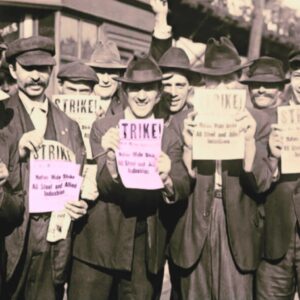
How to Write About Authoritarians Without Getting Arrested
Truth, Fiction, and Fake News in Pakistan
Every time I travel through Karachi airport, I stop by its bookshop. It’s not the best organized store in the world. The titles are jumbled together. Fiction merging with non-fiction, biographies next to self-help; books that travelers have opened, flipped through, and put back in the wrong section. Sometimes, I surreptitiously hide a biography or two in the fiction section.
Occasionally, the staff will recommend a book about a topic with a selection of fiction and non-fiction. It’s all the same, piled together on one rack, and treated the same way: If it’s written and it is published, it must be true.
In Pakistan, people are constantly looking for some version of the truth, browsing through their smartphones and the fiction racks of bookstores. There is a stream of rumors repeated on talk shows and forwarded on WhatsApp by people citing “sources” claiming to know the “real story” behind a militant attack or a political controversy. There are missives about impending doom: imminent security threats, crime statistics, and public health crises; tailored to suit one’s preset narrative. If you believe in x, y message—or novel—makes perfect sense.
In his latest novel The Party Worker, the Pakistani cop-turned-writer Omar Shahid Hamid depicts a political strongman called “Don” and a linchpin member in his network determined to bring him down. It has all the makings of a crime novel: cops on the hunt for blood and glory, Mafioso, bloody crime scenes, loyalties and betrayals.
But this isn’t an ordinary crime novel. The Don is a thinly-veiled caricature of a real-life Pakistani politician who lives in exile, and whose political party ruled Karachi for decades because of its broad urban appeal—and alleged violent tactics. Allegations against the party range from targeted assassinations to extortion, and writing about the politician, until recently, was largely off-limits. Reportage that critiqued the party’s exiled leader or mentioned the allegations led to sharp rebuttals and full-fledged tirades. Journalists covering the party were limited to reproducing sanitized press releases and transcripts of speeches. It was the party’s facts, period.
The Party Worker crosses that line drawn in newsprint, depicting the Don as an obese, power-hungry figure with a proclivity for sex workers and ice-cream soda mixed with vodka, whose party uses brutal tactics to control Karachi, while he is protected in exile and has a soft corner at the CIA. Hamid combines the tactics and behaviors of political strongmen to turn the characters in the novel into surreal figures. The book takes on from where reportage ends, imagining how to bring the Don to justice, creating a number of revengeful characters to take on the task. One of them, in truly irreverent Karachi fashion, is called “sisterf***er uncle.”
The novel feels like the unveiling of an in-joke that only residents of Karachi have been privy to. But it also feels like a suspension of normality; an illicit act of reading a long-forbidden text.
Why does a piece of fiction seem more revelatory than a constant barrage of news?
Reporting freely about authoritarian figures is largely impossible in countries like Pakistan. Writers who strike away from official narratives are dubbed as traitors and marked out for beatings, warnings and death. Reporters couch facts in layers of denials and restrain themselves from reporting. They use vague terms like “it remains to be seen”—a clichéd phrase to underscore the uncertainty of political events.
And so the fiction author has to do what a journalist cannot. The novel isn’t just a work of fiction; it is “alternative facts.” Readers expect novelists to tell them the stories that aren’t printed in newspapers; the “real” saga they’ve heard about on WhatsApp.
Hamid’s novels fulfill this demand. In his work, politicians and cops blend into fictional storylines, making it hard to separate the real and the imagined. Readers are invariably drawn into a Wikipedia spiral of matching up news stories with chapters. The plots combine the dispassionate recounting of police work with the visceral recollections of strongmen and criminals.
Hamid’s debut novel The Prisoner took its cue from the kidnapping of the Wall Street Journal reporter Daniel Pearl, who was executed in captivity in Pakistan. The central character is a cop called Akbar Khan, whose portrayal is drawn from and a lionization of Hamid’s real-life mentor, the controversial and illustrious police officer Chaudhry Aslam, who was killed in a bombing in 2014. The second, The Spinner’s Tale, draws from police files as well. It is based around a mysterious, well-educated prisoner reminiscent of Pearl’s kidnapper, the London School of Economics-educated Ahmed Omar Saeed Shaikh. The Party Worker bluntly describes a political party comprising a coterie of loyal cohorts ready to kill and extort on command. There’s a Mafioso in the making—another character seemingly plucked off the crime pages, whose name is a mishmash of two well-known criminal figures in Karachi. He is patronized by a political family, whose stories are drawn from real-life dynasties.
The militant, the politician, and the dictator: these authoritarian figures permeate fiction, appearing in the background of books set in Pakistan. Bapsi Sidhwa’s coming-of-age/immigrant novel An American Brat opens in Pakistan at a tremulous note. It is the 1970s. General Zia-ul-Haq has taken over in a military coup, deposing the prime minister Zulfikar Ali Bhutto, and trying him on charges of ordering the murder of a political opponent. The trial is underway in the city of Lahore, and going badly. This forms the background for a fictional tale. Worried about growing conservatism and life under the military regime, a Zoroastrian family in Lahore sends their teenage daughter Feroza to America for a short vacation. In New York, Feroza is hassled by Immigration and outraged by the officers digging through her luggage. She is terrified when a man appears in the bathroom at the YMCA, and is wide-eyed in museums. She stays on in the US for college. In her dorm room, she unfolds a poster of Bhutto to hang on the wall. Back home, Bhutto’s image and name are being erased from public consciousness. While An American Brat is about the immigrant experience, the military dictator is a character from afar: he keeps Feroza at bay and impels her to choose a new life.
Reading these novels feels like the moment when Harry Potter finds himself immersed in Professor Dumbledore’s Pensieve, awash with memories that aren’t his but are revelatory about the past.
Fiction serves as a way of reimagining history in countries where archives are guarded, and there is a long list of unsolved mysteries. It is authors, not historians, who are tasked with finding answers. Mohammed Hanif’s novel A Case of Exploding Mangoes weaves in fictional characters with real-life figures including General Zia, who ruled Pakistan for over a decade until he was killed in a plane crash in 1988. Whodunit theories about the plane crash have circulated for years. Hanif’s novel alludes to a crate of mangoes on board; a far-fetched conspiracy theory used as a plot device.
But in the years since the publication of A Case of Exploding Mangoes, the idea that there was an explosives-rigged crate of fruit on board the plane has filled in the gaping hole in the country’s history. At every literary event featuring Hanif that I’ve attended, an audience member earnestly pipes up with questions: “Is this book fiction or non-fiction? Is this what really happened to General Zia? Were there really mangoes on the plane?”
There’s a palpable sense of disappointment when the author says the book is a work of fiction. If he doesn’t know, who does?
It is a disservice to writers that their art is often merely treated as fictionalized versions of headlines. It is an unfair burden on novelists to explain politics or crime or dysfunctional cities; it is even more unfair that their work is often construed to be “representative” of an entire country or faith or region. And inasmuch as it is resentful as a writer to be constantly asked if one’s work is autobiographical or based on real people or is a names-changed version of a declassified document, there is little else one can expect. In the absence of facts, people will turn to fiction; when fiction runs out, they will seek comfort in scurrilous forwarded messages. After all, people need to look somewhere to find the truth, anything that will explain away the malaise of their cities, and their lives.
Saba Imtiaz
Saba Imtiaz is a freelance journalist currently based in the Middle East. She writes about culture, food, urban life, and religion. Her work has appeared in the New York Times, the Guardian, and Roads and Kingdoms. She is the author of the novel Karachi, You’re Killing Me! (Penguin Random House India, 2014), and is working on a non-fiction book titled No Team of Angels – Murder, Violence and Land in Pakistan’s Largest City: Karachi (First Draft Publishing).



















